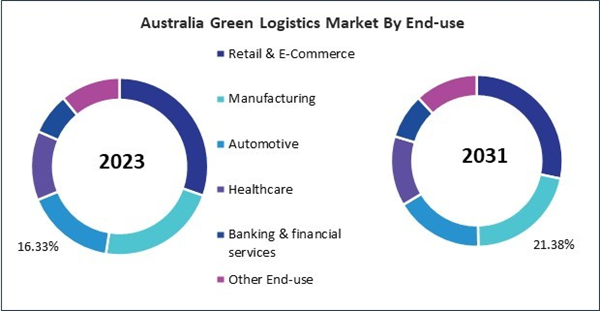The China market dominated the Asia Pacific Green Logistics Market by country in 2023, and is expected to continue to be a dominant market till 2031; thereby, achieving a market value of $263.48 billion by 2031. The Japan market is experiencing a CAGR of 7.7% during 2024-2031. Additionally, the India market is expected to exhibit a CAGR of 9% during 2024-2031.
Collaborative logistics networks and regulatory initiatives further support adopting circular supply chain models. Companies like DHL and UPS are implementing reusable packaging systems, consolidated shipping, and carbon-neutral shipping options to optimize resource utilization and lower emissions. While challenges like high initial costs and supply chain complexity exist, technological advancements, digital tracking, and regulatory support drive a shift toward sustainable logistics solutions. As more industries embrace circular logistics, businesses reduce costs and environmental impact and gain a competitive advantage in the evolving economy.
As urbanization accelerates, cities adopt sustainable urban freight solutions to combat congestion and emissions. Micro-mobility options, such as e-bikes, cargo bikes, and electric scooters, are increasingly used for short-distance deliveries. Companies like DHL, FedEx, Uber Eats, and Amazon are integrating e-bike fleets to optimize last-mile logistics. DHL’s electric cargo bikes reduce carbon emissions by up to 60% per delivery.
Singapore's strategic position and dedication to smart logistics solutions are making it a regional leader in sustainable logistics. The Sustainable Logistics Framework, developed under the Green Plan 2030, promotes using autonomous electric freight vehicles, urban micro-mobility solutions, and AI-powered inventory systems. The Tuas Mega Port, designed to be one of the world’s most sustainable ports, integrates solar energy, automated cranes, and AI-driven ship route optimization to minimize carbon emissions. Companies like DB Schenker and DHL are heavily investing in green warehousing and sustainable supply chain technologies to align with Singapore’s eco-friendly logistics vision. Thus, green logistics will continue to influence supply chain management in Asia Pacific as e-commerce, urbanization, and climate change legislation grow.
List of Key Companies Profiled
- United Parcel Service, Inc.
- C.H. Robinson Worldwide, Inc.
- Deutsche Bahn AG (DB Schenker)
- Yusen Logistics Co., Ltd. (Nippon Yusen Kabushiki Kaisha)
- XPO, Inc.
- Kuehne + Nagel International AG (Kuehne Holding AG)
- FedEx Corporation
- DSV A/S
- Deutsche Post DHL Group (The Deutsche Post AG)
- A.P. Moller-Maersk A/S
Market Report Segmentation
By Mode of Transportation
- Roadways
- Railways
- Waterways
- Airways
By Business Type
- Warehousing
- Distribution
- Value added services
By End-use
- Retail & E-Commerce
- Manufacturing
- Automotive
- Healthcare
- Banking & financial services
- Other End-use
By Country
- China
- Japan
- India
- South Korea
- Australia
- Malaysia
- Rest of Asia Pacific
Table of Contents
Companies Mentioned
- United Parcel Service, Inc.
- C.H. Robinson Worldwide, Inc.
- Deutsche Bahn AG (DB Schenker)
- Yusen Logistics Co., Ltd. (Nippon Yusen Kabushiki Kaisha)
- XPO, Inc.
- Kuehne + Nagel International AG (Kuehne Holding AG)
- FedEx Corporation
- DSV A/S
- Deutsche Post DHL Group (The Deutsche Post AG)
- A.P. Moller - Maersk A/S









